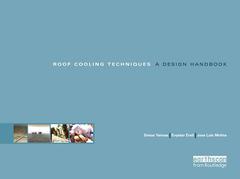Description
Roof Cooling Techniques
A Design Handbook
Author: Erell Evyatar
Coordinators: Yannas Simos, Molina Jose Luis
Language: English
Subjects for Roof Cooling Techniques:
Keywords
pond; air; thermal; temperature; insulation; radiation; longwave; solar; ambient; absorptivity; Roof Pond; Longwave Radiation; Moisture Content; Cooling Panel; Energy Savings; Roof Cooling; Pond Cover; Solar Absorptivity; Radiative Cooling; Waterproofing Layer; Ambient Wet Bulb Temperature; Roof Pond System; Ambient Dry Bulb Temperature; Performance Assessed; Ridge Roof; Square Metre Floor Area; Corrugated Metal Deck; Convective Heat Loss Coefficient; Cooling Output; Heat Transfer Fluid; Sky Temperature; Monthly Global Solar Radiation; La Catalana; Sedum Album; Incident Global Solar Radiation
Publication date: 02-2019
· 21x28 cm · Hardback
Approximative price 96.92 €
Subject to availability at the publisher.
Add to cartPublication date: 09-2005
· 21x28 cm · Paperback
Description
/li>Contents
/li>Readership
/li>Biography
/li>
Simos Yannas is Director of Environment and Energy Studies, Architectural Association, London, UK. In 2001, he was awarded the PLEA Lifetime Achievement Award.
Evyatar Erell works at the Desert Architecture Unit at the Jacob Blaustein Institute for Desert Research, Ben-Gurion University of the Negev, Israel.
Jose Luis Molina works at the Department of Thermal Energy Engineering at the University of Seville, Spain
These books may interest you

Advances in Passive Cooling 53.83 €



